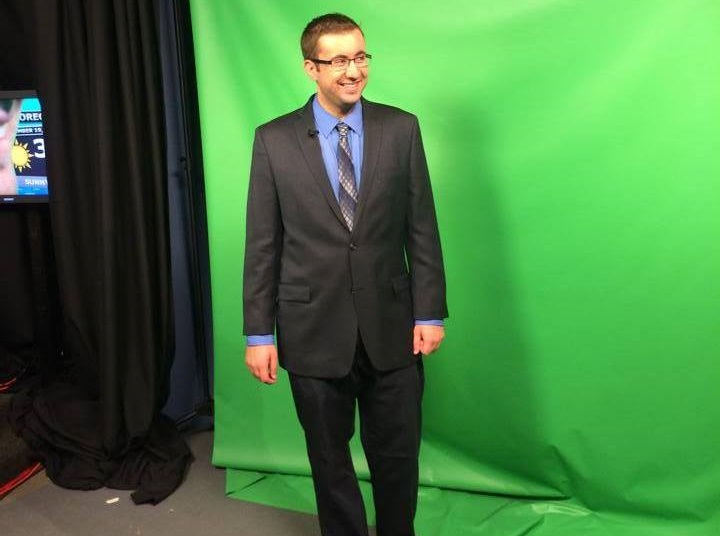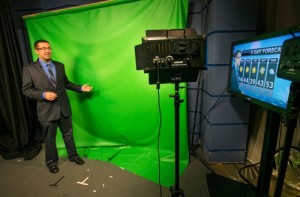From http://www.stonybrook.edu/sb/features-colbert.html?=marquee2#.VH3uYclRd8E
—By Glenn Jochum; photo by John Griffin
Everyone talks about the weather, but Michael Colbert ’15 has more than a casual interest in that topic — he studies it at Stony Brook University.
To be sure, the atmospheric and oceanic sciences major can’t remember a time when he wasn’t passionate about the weather.
“My mother says that as a baby, there were times when I wouldn’t fall asleep unless she took me outside to look up at the sky first,” Michael said.
When he was in elementary school, Michael used writing assignments as an opportunity to report on atmospheric conditions. “What was the weatherman predicting for tomorrow? How long were the icicles hanging off my roof? How strong were the winds last night?”
Michael said that growing up in a waterfront home on the Neguntatogue Creek in Lindenhurst, New York — which gave him a front-row seat to view nature’s full force — influenced his decision to pursue atmospheric and oceanic sciences.
“On the coast, you often see precipitation transition from snow to sleet to rain, and then back the other way as cold air comes in at the end of a storm. You also get to see coastal flooding and experience more intense winds found near the ocean,” he said. “During the warm season, the sea breeze can trigger thunderstorms, and that happens to be the topic of my Honors College senior research project — what are the factors that allow some sea breeze boundaries to trigger thunderstorms?”
The Internet has made it easy for Michael to watch the weather unfold minute by minute on satellite and radar. As early as his freshman year in high school, he paid special attention to weather trends, which led to him posting forecasts on Facebook.
When Michael arrived at Stony Brook, he created SBUWeather, a Facebook page managed by the Meteorology Club, which provides forecasts to more than 700 students, staff and faculty on campus and to surrounding communities.
“I am fortunate that I have a large number of people who actually look to me for a weather forecast when they are making important plans,” he said.
But the accomplishment of which Michael is most proud is helping to grow the Stony Brook Meteorology Club to its current membership of 40 weather buffs. After he was elected president, he and his expanded club created a Web page on which they post forecasts.
Under Michael’s leadership, the club made its debut at the Involvement Fair, wearing T-shirts the members created.
Feeding on a growing interest in the club, Michael began organizing field trips to regional conferences; the National Weather Service in Upton, New York; and local news stations to observe live forecasts. “Last year we visited ABC in New York City, and earlier this fall we took a trip to News 12,” he said.
To further increase its exposure, Michael initiated the club’s participation in Earthstock the past two years. This year the members built a boat named “Hurricane Force” that competed in the Roth Regatta.
Last year Michael served an internship at the Upton National Weather Service facility, where he collected data using instruments called radiosondes, which are battery-powered devices carried into the atmosphere that transmit findings by radio to a ground receiver.
This past summer, he conducted research at Colorado State University, exploring the volume of hail in thunderstorms and associated lightning flash rates. These findings will be presented at the American Meteorological Society annual meeting in Phoenix, AZ, in January.
Michael is currently coordinating a joint effort with the School of Journalism to provide broadcast experience to atmospheric and oceanic science majors.
“Even though the National Weather Service is my first choice to start my career path, every time I’m in a newsroom I get an overwhelming feeling of excitement, so I hope I get that opportunity to do that at some point in my life,” he said.
Other areas that Michael said he would like to work on are smartphone applications and technologies that report the weather and help people prepare for adverse conditions.
“The weather is something that affects everyone every day. It never stops changing, so I can never stop watching it,” he said.





